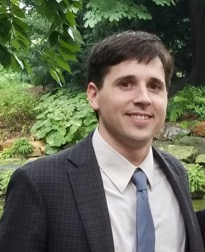 Matthew Minus, Ph.D. University of Texas at Austin NIH CORE Postdoctoral Fellow Department of Chemistry Email: mbm6@utexas.edu |
Detection of enantiomeric excess via semicovalent supramolecular zinc assemblies Matthew B. Minus received his BS in Chemistry in 2009 from Texas Southern University in Houston, TX. For the next two years he taught high school chemistry, mentored, and coached football. After this short stint Matt returned to his studies at Rice University where he earned his PhD in Chemistry in 2017. While at Rice University he conducted research under the guidance of Prof. Zachary T. Ball. His research focused on developing rhodium enhanced small molecule inhibitors as intracellular probes. Matt is now a post-doctoral researcher in the Anslyn Lab at UT Austin. His current work involves optimizing zinc supramolecular assemblies to determine the enantiomeric purity of β-chiral alcohols. |
 Jeffrey E. Dick, Ph.D. University of Texas at Austin NIH CORE Postdoctoral Fellow Department of Chemistry Email: jedick@utexas.edu |
Understanding the DNA Damage Response Jeffrey E. Dick earned a B.S. in Chemistry from Ball State University in Muncie, IN. He then went on to earn a Ph.D in Chemistry under the mentorship of Allen J. Bard at the University of Texas at Austin. Currently, Jeffrey is a postdoc in Kyle Miller’s lab at UT Austin investigating the effect of histone crotonylation on the DNA damage response. |
 Gretchen Marie Peters, Ph.D. University of Texas at Austin NIH CORE Postdoctoral Fellow Department of Chemistry Email: gretchen.peters@austin.utexas.edu |
Calix[4]pyrrole gels: media for ion extraction and environmental remediation Gretchen Marie Peters received her B.A. degree in Chemistry in 2010 from Luther College in Decorah, IA. Subsequently, she moved to the University of Maryland and worked with Professor Jeffery T. Davis, earning her PhD in 2015. While in the Davis group, her research focused on the development of functional guanosine receptors for small molecule transport and elucidating the structural composition and practical applications of guanosine-borate hydrogels. Currently, Gretchen is a postdoctoral researcher at the University of Texas at Austin working with Professor Jonathan L. Sessler. At UT Austin, Gretchen’s research focuses on designing calix[4]pyrrole receptors to function as anion hosts and ion extractants. In particular, Gretchen is interested in employing the molecular recognition properties of these calixpyrrole receptors to develop novel soft materials for ion separation and environmental remediation applications. |
|
|
|
 Erin Taylor, Ph.D. University of Texas at Austin NIH CORE Postdoctoral Fellow Department of Molecular Biosciences Email: elmimich@utexas.edu |
Characterization of mitochondrial polymerase γ mutants and their role in mitochondrial disease Erin Taylor earned a B.S. in biochemistry and molecular biology at Otterbein College in 2010 and a Ph.D. in biochemistry at the University of Michigan in 2015. Her graduate research focused on kinetic mechanisms of DNA repair glycosylases in the base excision repair pathway. As a postdoctoral fellow in the Kenneth Johnson lab, she is studying polymerase gamma (γ), which is responsible for replication and repair of the mitochondrial genome (mtDNA). Mutations in Pol γ lead to errors and degradation of mtDNA, causing a set of disorders termed mitochondrial disease. Using a humanized yeast model system and purified proteins, she will characterize the kinetic mechanisms of various Pol γ mutants and their relationships to human disease phenotypes. Erin is interested in teaching and mentoring undergraduates at small liberal arts institutions. |
|
|
|
 Michael Cammarata, Ph.D. University of Texas at Austin NIH CORE Postdoctoral Fellow Division of Chemistry Email: mbcammara@gmail.com |
Development of High Performance Mass Spectrometry Applied to Structural Biology: Utilizing UVPD for Determination of Macromolecular Protein Complex Topology Michael Cammarata graduated with a B.S. in Chemistry from Trinity University in San Antonio and earned his Ph.D. from University of Texas at Austin in Chemistry. His graduate studies included developing new techniques for structural biology with the use of mass spectrometry, specifically ultraviolet photodissociation (UVPD) for ion activation implemented as a top-down (intact protein) methodology. He applied this strategy in conjunction with covalent modification techniques to measure surface accessibility of proteins as well as crosslinking experiments to elucidate spatial information. Additionally, UVPD was used to characterize native-like proteins with and without bound cognate ligands or specific inhibitors. Changes in UVPD fragmentation between these bound and unbound states were indicative of regions of conformational changes of the protein. This methodology was successfully applied to study interactions of known inhibitors as well as novel inhibitors with dihydrofolate reductase (DHFR). The strategy has also been applied to the characterization of the structure of oncogene KRas to elucidate the dynamic conformational changes mediated by G12X mutations. Michael is continuing his work with Jennifer S. Brodbelt to study the topology of macromolecular protein complexes through protein crosslinking and native mass spectrometry. |
|
|
|
 Michael G. Chiorazzo, Ph.D. University of Texas at Austin NIH CORE Postdoctoral Fellow Division of Medicinal Chemistry Email: mchio@utexas.edu |
Understanding the role of maternal embryonic leucine zipper kinase (MELK) in cancer Michael Chiorazzo earned a B.S. in Chemistry and Biology from Ramapo College of New Jersey and a Ph.D. in Pharmacology from the University of Pennsylvania. During his graduate studies, he worked on developing long wavelength activatable fluorophores, to serve as contrast agents in near infrared (NIR) fluorescence guided surgery of cancer. NIR fluorescence guided surgery has rapidly gained attention in the field of surgical oncology for its ability to increase rates of complete tumor resection and thus decrease rates of recurrence and metastasis. Michael developed a fluorophore specific towards cytosolic phospholipase A2, which has increased activity in triple negative breast cancer versus healthy tissue, and demonstrated its ability to image triple negative breast cancer in cellular and mouse models. As a postdoctoral fellow, Michael is investigating a protein kinase, maternal embryonic leucine zipper kinase (MELK) for its role in the progression and therapeutic response of triple negative breast cancer. Michael’s research under the guidance of Kevin N. Dalby and Karen M. Vasquez seeks to understand the biological mechanisms related to the role of MELK in DNA repair and transcriptional regulation. This research has the potential to elucidate the impact of anti-MELK therapy in addition to identifying novel therapeutic targets in triple negative breast cancer. |
|
|
|
 Peggy Williams, Ph.D. University of Texas at Austin NIH CORE Postdoctoral Scholar Department of Chemistry Email: peggy.williams@utexas.edu |
Development and applications of UVPD-MS strategies for characterization of lipopolysaccharides (LPS) from gram-negative bacteria Peggy Williams earned a B.S. in Chemistry from Indiana State University in 2009 and a Ph.D. in Chemistry at Purdue University in 2014. Her graduate research focused on characterizing free radicals and studying their reactivity toward small biomolecules in both the gas phase and in solution. Her gas-phase ion chemistry research employing ion-molecule reactions in a mass spectrometer led her abroad to Australia where she developed robust HPLC methods that were coupled to advanced ion-molecule reaction based mass spectrometric methods for the differentiation of isomeric lipids. Her experience abroad in lipid analysis brought her back to the US and to UT Austin where her work as a CORE postdoctoral fellow is focusing on developing and applying ultraviolet photodissociation (UVPD) approaches for characterization of lipopolysaccharides (LPS) from gram-negative bacteria. This research has the potential to allow for a deeper understanding of how the structure of LPS influences immune stimulation and facilitate the development of bacterial vaccines and new antimicrobial drugs. |
|
|
|
|
|
|
 Alfred Tuley, Ph.D. University of Texas at Austin NIH CORE Postdoctoral Scholar Department of Chemistry Email: alfred.tuley@gmail.com |
----- Alfred received his B.S. in chemistry from Texas A&M University-Corpus Christi and his Ph.D. in chemistry from Texas A&M University-College Station. During his graduate work, under the guidance of Prof. Wenshe Liu, Alfred studied genetic code expansion using a number of non-canonical phenylalanine derivatives. These phenylalanine derivatives include a series of aliphatic compounds designed to survey the substrate scope of a mutant pyrrolysyl-tRNA synthetase, as well as the development of a genetically encoded aldehyde for rapid protein labeling under physiologically relevant conditions. In addition to genetic code expansion, Alfred has performed extensive work to elucidate the reaction mechanism for the copper-catalyzed azide-alkyne cycloaddition (CuAAC), an important reaction that is ubiquitous in chemical biology research. Alfred is now a postdoctoral researcher in the laboratory of Prof. Walter Fast, where he will investigate the covalent modification of enzymes using halopyridines and similar scaffolds. |
|
|
|
Collaborative Opportunities for Research Educators
(CORE)

Contact
Jenny Brodbelt (PI)
jbrodbelt@cm.utexas.edu
Department of Chemistry
1 University Station A5300
University of Texas
Austin, TX 78712